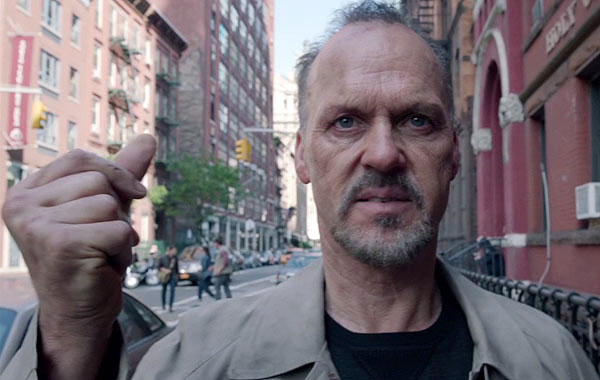
Birdman or (The Unexpected Virtue of Ignorance)
*/****
starring Michael Keaton, Zach Galifianakis, Edward Norton, Andrea Riseborough
screenplay Alejandro González Iñárritu, Nicolás Giacobone, Alexander Dinelaris, Jr. & Armando Bo
directed by Alejandro González Iñárritu
by Walter Chaw A benighted, gangly thing midway between a mid-life crisis Black Swan and the Noises Off version of Brazil, Alejandro González Iñárritu's Birdman is the lonesome yawp of a limited, one-trick-pony given now to defensiveness and self-consciousness. Assailing the tale of a washed-up former mega-star of superhero blockbusters, Riggan Thompson (Michael Keaton, check), who's trying to gain a measure of self-respect on Broadway in a Raymond Carver adaptation he wrote, directed, and is starring in, the picture doesn't do anything it doesn't warn us about first and then apologize for after. It covers the three preview performances leading to opening night in one, digitally-unbroken take, making room along the way for Method asshole Michael Shiner (Method asshole Edward Norton)–who steals both the play Birdman is about and the play-within-a-play conceit of the movie by stealing the movie–and tons of narrative melodramatics, including a neurotic leading lady (Naomi Watts), Riggan's burnout daughter (Emma Stone), and his stressed-out lawyer/manager (Zach Galifianakis). The whole story roils with desperation and disappointment, and the film-as-object does the same–the transparency between those two things (cine-reality and sad-truth-of-it reality) cited repeatedly in the screenplay-by-committee in exhausting, self-abnegating fashion. Birdman is an incredible bore. The closest analogue in feel is Todd Solondz's unfortunate riposte to his detractors, Storytelling, but at least that one wasn't all tarted up in attention-grabbing technical pandering. Birdman is about as clever as that Blues Traveler song: the tedious offense of idiots calling you an idiot.

